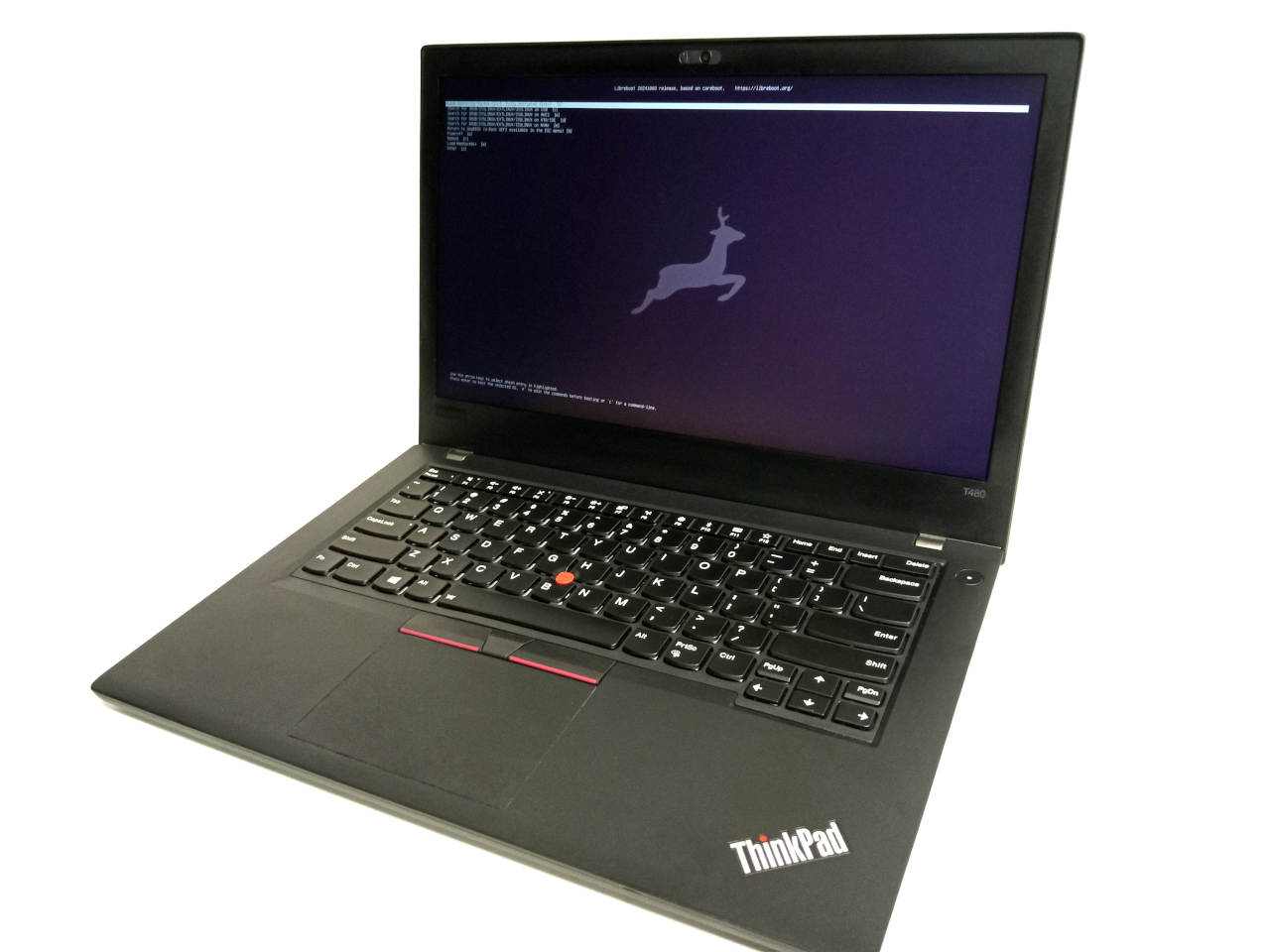



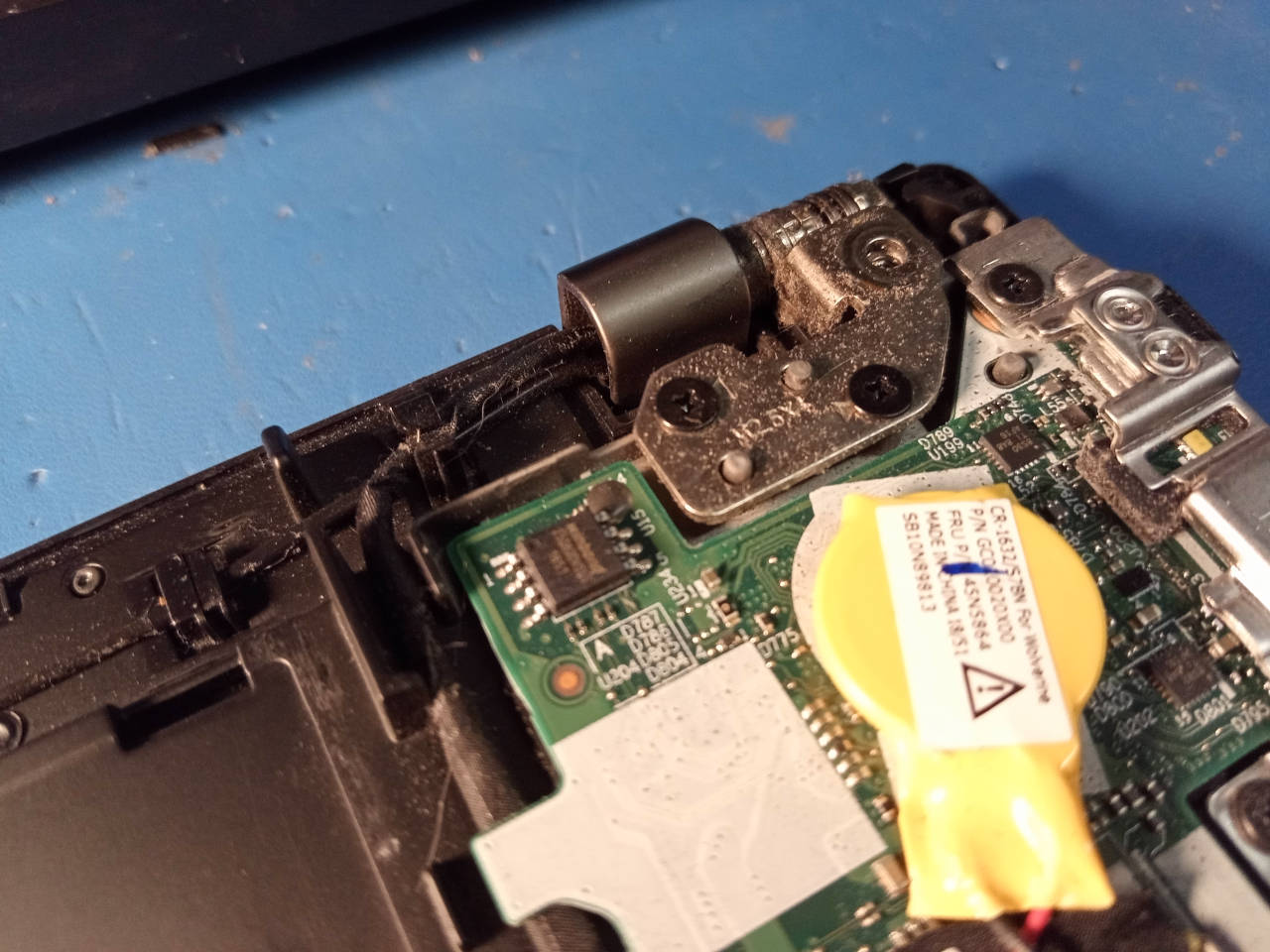
 This page shows how to do that:
This page shows how to do that:
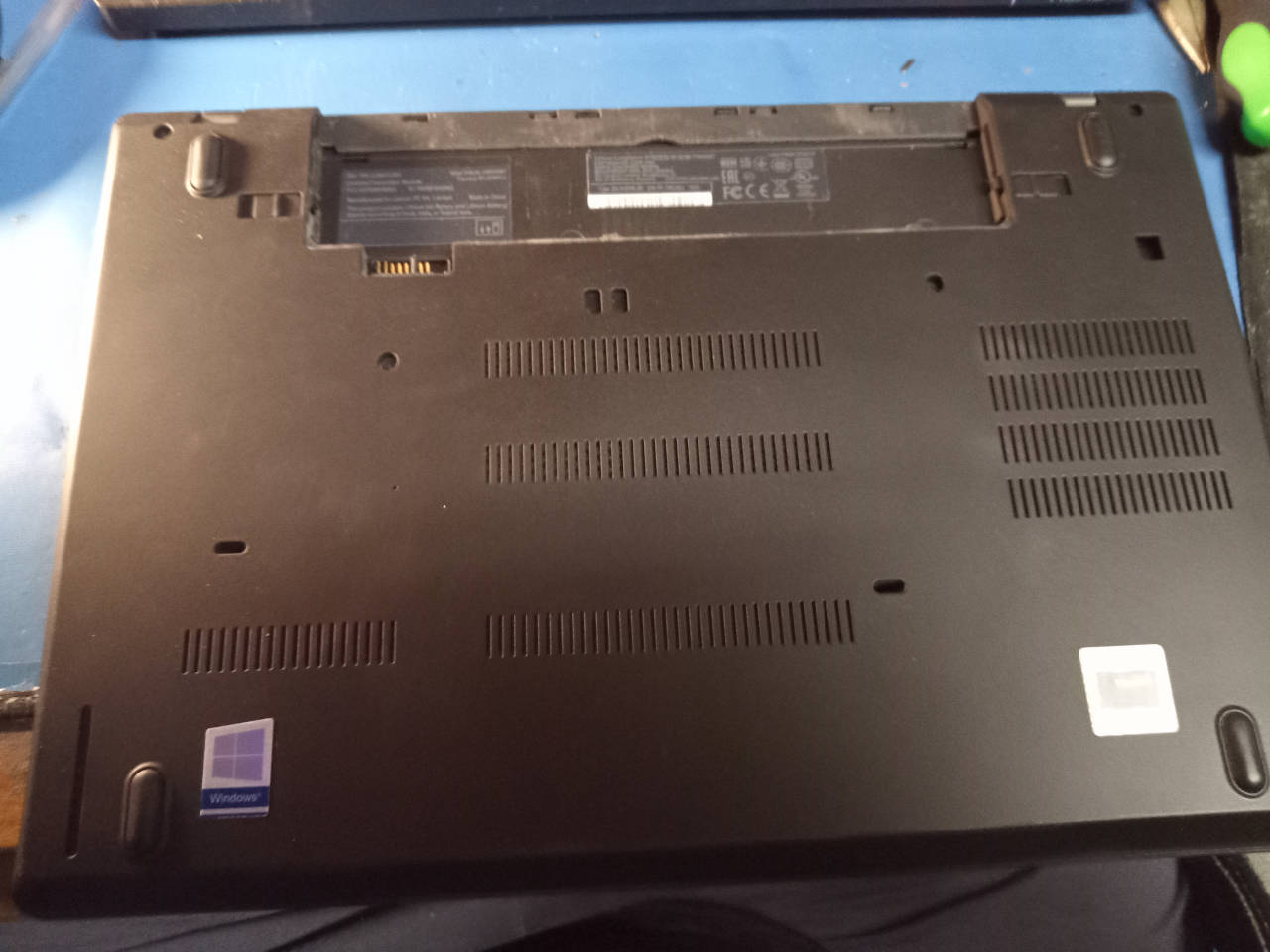
 Remove all screws, and you can gently pry off the lower chassis and remove,
which then allows you to see the inner mainboard:
Remove all screws, and you can gently pry off the lower chassis and remove,
which then allows you to see the inner mainboard:
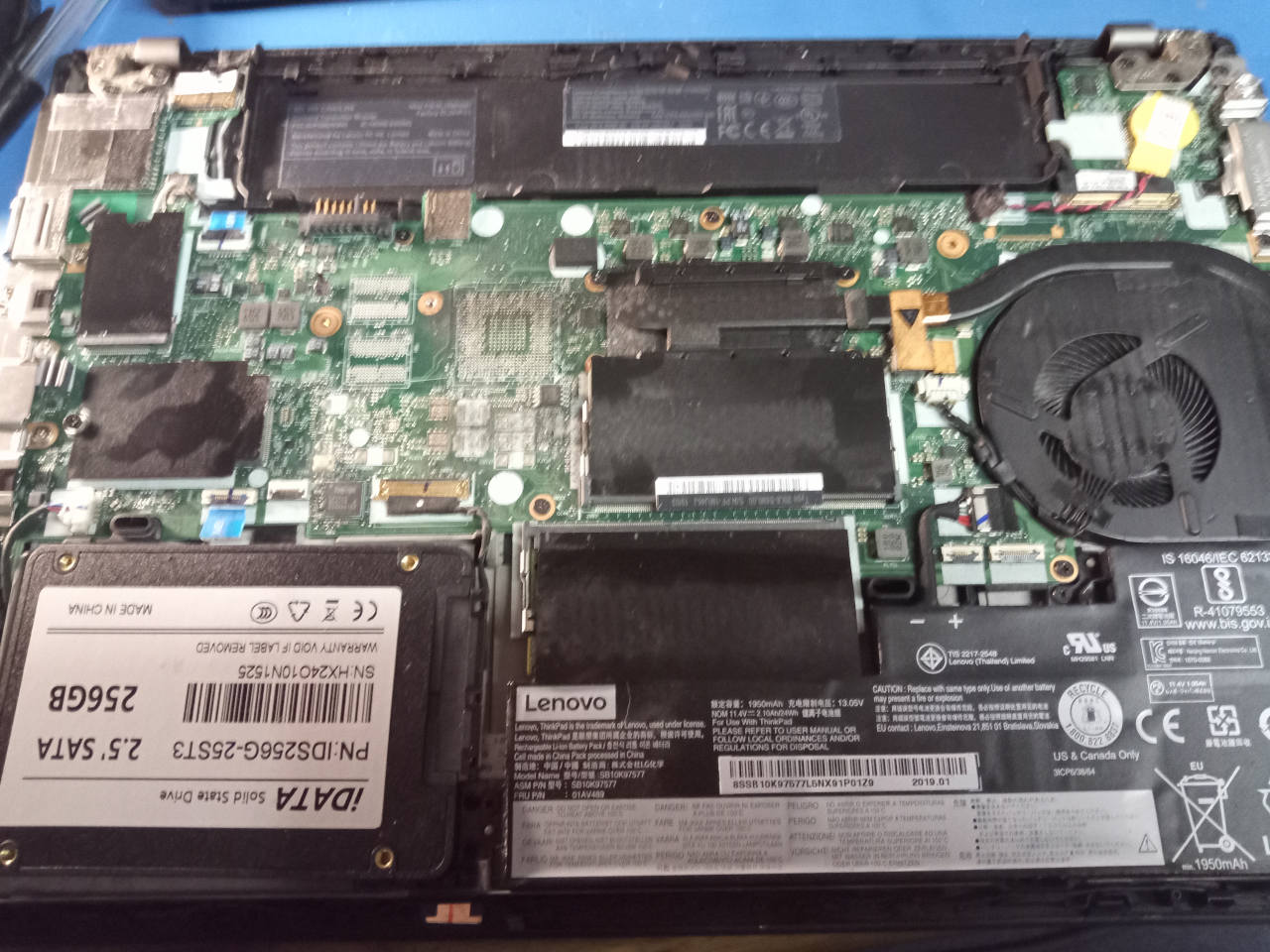
 **WARNING: PLEASE MAKE SURE to remove the battery before flashing. The T480
and T480s can both contain INTERNAL batteries, and the T480 has an additional
external battery. Remove the internal battery via the connector, like so (T480):**
**WARNING: PLEASE MAKE SURE to remove the battery before flashing. The T480
and T480s can both contain INTERNAL batteries, and the T480 has an additional
external battery. Remove the internal battery via the connector, like so (T480):**
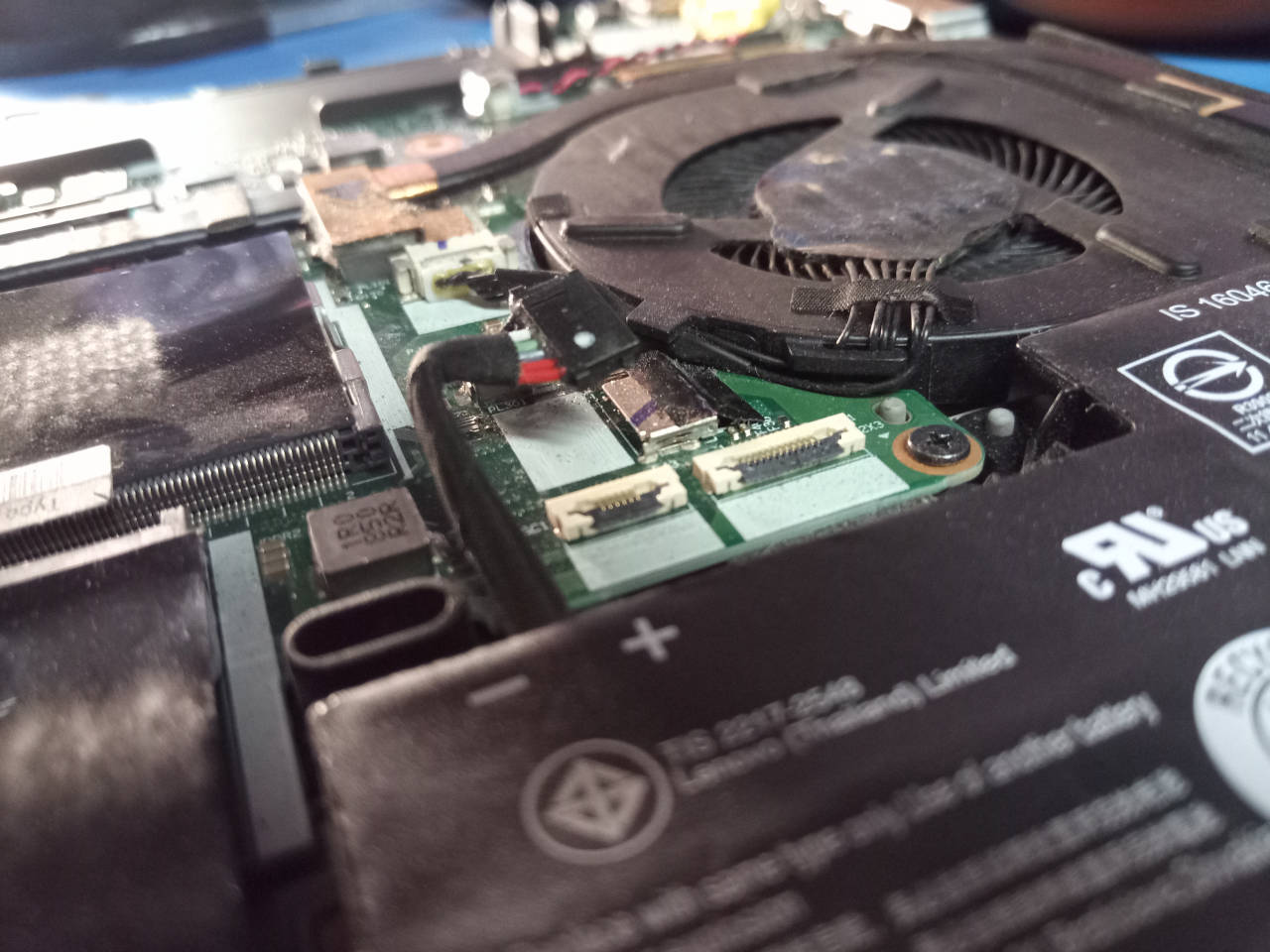
 On the T480s (S model) the internal battery is much larger, and the connector
on it is built into the battery, so it is necessary to carefully remove the
entire battery; on regular T480 (non-S model) the internal battery can be
isolated via the connector as depicted above.
This photo shows the flash:
On the T480s (S model) the internal battery is much larger, and the connector
on it is built into the battery, so it is necessary to carefully remove the
entire battery; on regular T480 (non-S model) the internal battery can be
isolated via the connector as depicted above.
This photo shows the flash:
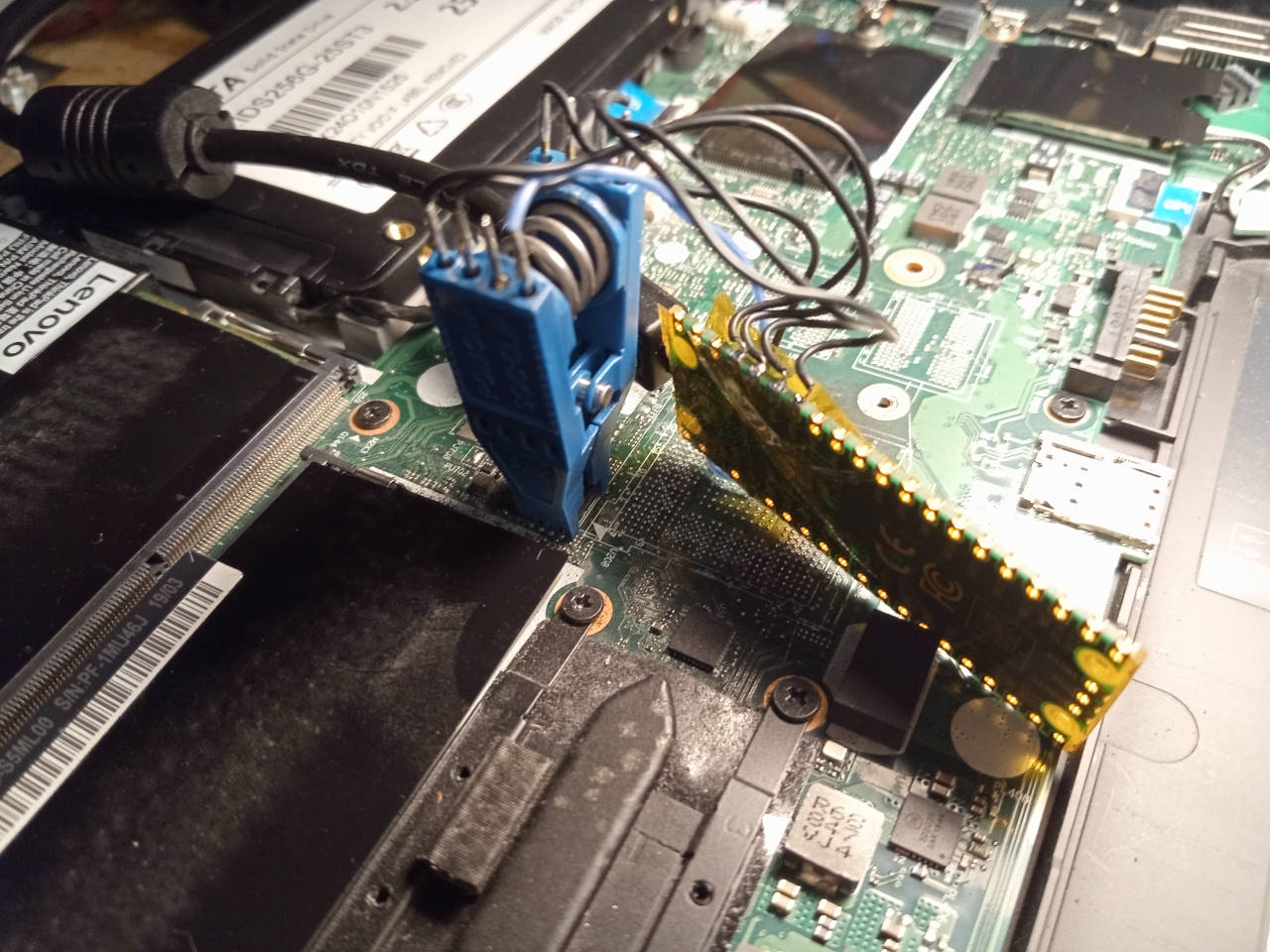
 There is another flash, for the Thunderbolt firmware, which you are to briefly
ignore; we'll cover it later:
There is another flash, for the Thunderbolt firmware, which you are to briefly
ignore; we'll cover it later:

 To be clear: the system flash (16MB) is what you put Libreboot on. The
Thunderbolt firmware flash is much smaller, so you'll know because flashprog
will complain about wrong flash size if you're trying to flash the wrong one.
On the T480s (S model), the flashes are in slightly different places but in
both machines, the system flash (for Libreboot) is toward the centre, near
the memory.
Post-installation
=================
These next sections will tell you how to use certain hardware features, which
work a little bit differently due to idiosyncrasies of coreboot.
How to use the headphone jack
--------------
Sometimes the headphone jack might not work automatically. Simply install
the `pavucontrol` program. Under Output Devices, you can select the headphones
you've inserted manually.
If it says "Unplugged", try it anyway. The HDA Verb may be incorrect. This
will be investigated and a hotfix patch made to the Libreboot 20241206 images.
How to use HDMI audio
------------------
You can get audio from Displayport/HDMI, but you must select it manually.
For example, you can select it in `pavucontrol` if you're using PulseAudio or
PipeWire.
How to use backlight controls
-----------------------------
Backlight controls work, via software control (e.g. `xbacklight` utility), but
the Fn keys for it don't currently work, as of 6 December 2024.
You can set the backlight manually, or use a hotkey, depending on your window
manager or desktop environment.
UART
----
To our knowledge, this functionality is *only* available in coreboot-based
firmware such as Libreboot. It is completely unsupported on the original
firmware!
A serial console is possible via the line-out (headphone jack). Not yet tested
on the T480s (S model), nor implemented, but it is working on the regular
T480 (non-S model).
**TODO: show photo and wiring diagram here.**
Use baud rate 115200 in your favourite serial terminal client, e.g. GNU Screen.
Next to the headphone jack on the T480, you will find pads for two 0ohm jumpers,
normally unpopulated, but you can bridge each jumper yourself using a 0ohm 0201
jumper; alternatively, simply strip a bit a wire (30awg solid core) and carefully
solder the wire across each of the pad jumpers, then carefully using a pair
of side cutters to cut off the excess wire, being careful not to rip the pads!
If you do this, please make sure to have the latest EC firmware as of 5
December 2024 (do not use older than what was latest on this day, and don't
use newer versions), because the code for this in coreboot targets a specific
area of code within the EC firmware.
You can then wire a 3.5mm stereo plug. On the other end you will wire your
TX/RX lines as you wish, to a suitable UART adapter; any 3.3v-rated TTL
adapter should work. The Raspberry Pi Pico can be used for this, which is handy
because that can also be used as a serprog-based NOR flasher!
The T480s (S model) schematics is a bit different and the signals are
properly muxed. Note that this is not to be confused with `spkmodem`, which
has not been tested on these boards (but could theoretically be possible too).
Idea for 2nd NVMe mod
----------------------
Interestingly, on boards without the Nvidia graphics, the solder pads for all
the componentry (including the GPU) is still present, so you could theoretically
design a QSB that solders to the right pads, and use it to wire a 2nd NVMe SSD;
the port is still enabled in Libreboot even if nothing is plugged into it, so it
should just work. (this doesn't actually exist yet, but it is electrically
possible, quite feasible to design/manufacture and already supported in the
Libreboot firmware in principle, since than PCI-E lane is enabled in the devicetree)
Mate Kukri came up with this idea. It's a great idea, so it's written here.
This mod is possible on both the T480 and T480s, though on T480s there would
be less clearance; using a smaller internal battery and having a makeshift
NVMe caddy in the remaining space would be how to go about it there. On the
regular T480, the existing caddy area could easily fit two NVMe drives.
Errata
======
Some features either don't work, or are untested, when running Libreboot on
the ThinkPad T480 or T480s.
NFC support in T480
-------------------
Some T480 models might have NFC support but this is untested in Libreboot, and
probably dosen't work in current Libreboot releases.
The PCH's NFC device is unsupported in Linux anyway.
Touchscreen on T480
-------------------
Some T480 machines have touchscreens. These are untested; the touch functionality
probably doesn't work yet, in Libreboot.
The digitizer is simply a USB device, which *is* enabled, but it's just untested.
Smartcard reader
----------------
The smartcard reader is enabled but it is still untested. If you have one,
please test it and report back to the Libreboot project.
Thunderbolt not supported yet
-----------------------------
Thunderbolt is a way to get PCI-E on a USB port. With it, you can use
high-bandwidth devices such as 10Gbps network interfaces.
The thunderbolt controller is currently unconfigured, so you can't use
Thunderbolt, but the thunderbolt and regular USB-C connector can both be
used for charging, and both can be used for video output (it shows up in xrandr
as a DisplayPort).
[t480-thunderbolt-20241206-unstable.patch](This patch) can be added, enabling
Thunderbolt, but be warned: it is completely untested, as of Libreboot 20241206.
This patch is *NOT* included in the release, because it breaks on S3 resume,
and may cause a kernel panic. Also: currently testing only reveals that the
ThunderBolt controller shows up, and it was confirmed that USB devices do
work on the port, but everything else is UNTESTED.
You also need the [gerrit patch](https://review.coreboot.org/c/coreboot/+/75286)
adding a Thunderbolt driver to coreboot.
To apply these patches, do the following in a fresh clone of `lbmk.git` and do:
```
git checkout 20241206-t480-thunderbolt-unstable
```
In it, you'll find this commit:
```
commit 3881160b863ff53df9064a29a25aab55c76ee9c4 (HEAD -> 20241206-t480-thunderbolt-unstable)
Author: Leah Rowe
To be clear: the system flash (16MB) is what you put Libreboot on. The
Thunderbolt firmware flash is much smaller, so you'll know because flashprog
will complain about wrong flash size if you're trying to flash the wrong one.
On the T480s (S model), the flashes are in slightly different places but in
both machines, the system flash (for Libreboot) is toward the centre, near
the memory.
Post-installation
=================
These next sections will tell you how to use certain hardware features, which
work a little bit differently due to idiosyncrasies of coreboot.
How to use the headphone jack
--------------
Sometimes the headphone jack might not work automatically. Simply install
the `pavucontrol` program. Under Output Devices, you can select the headphones
you've inserted manually.
If it says "Unplugged", try it anyway. The HDA Verb may be incorrect. This
will be investigated and a hotfix patch made to the Libreboot 20241206 images.
How to use HDMI audio
------------------
You can get audio from Displayport/HDMI, but you must select it manually.
For example, you can select it in `pavucontrol` if you're using PulseAudio or
PipeWire.
How to use backlight controls
-----------------------------
Backlight controls work, via software control (e.g. `xbacklight` utility), but
the Fn keys for it don't currently work, as of 6 December 2024.
You can set the backlight manually, or use a hotkey, depending on your window
manager or desktop environment.
UART
----
To our knowledge, this functionality is *only* available in coreboot-based
firmware such as Libreboot. It is completely unsupported on the original
firmware!
A serial console is possible via the line-out (headphone jack). Not yet tested
on the T480s (S model), nor implemented, but it is working on the regular
T480 (non-S model).
**TODO: show photo and wiring diagram here.**
Use baud rate 115200 in your favourite serial terminal client, e.g. GNU Screen.
Next to the headphone jack on the T480, you will find pads for two 0ohm jumpers,
normally unpopulated, but you can bridge each jumper yourself using a 0ohm 0201
jumper; alternatively, simply strip a bit a wire (30awg solid core) and carefully
solder the wire across each of the pad jumpers, then carefully using a pair
of side cutters to cut off the excess wire, being careful not to rip the pads!
If you do this, please make sure to have the latest EC firmware as of 5
December 2024 (do not use older than what was latest on this day, and don't
use newer versions), because the code for this in coreboot targets a specific
area of code within the EC firmware.
You can then wire a 3.5mm stereo plug. On the other end you will wire your
TX/RX lines as you wish, to a suitable UART adapter; any 3.3v-rated TTL
adapter should work. The Raspberry Pi Pico can be used for this, which is handy
because that can also be used as a serprog-based NOR flasher!
The T480s (S model) schematics is a bit different and the signals are
properly muxed. Note that this is not to be confused with `spkmodem`, which
has not been tested on these boards (but could theoretically be possible too).
Idea for 2nd NVMe mod
----------------------
Interestingly, on boards without the Nvidia graphics, the solder pads for all
the componentry (including the GPU) is still present, so you could theoretically
design a QSB that solders to the right pads, and use it to wire a 2nd NVMe SSD;
the port is still enabled in Libreboot even if nothing is plugged into it, so it
should just work. (this doesn't actually exist yet, but it is electrically
possible, quite feasible to design/manufacture and already supported in the
Libreboot firmware in principle, since than PCI-E lane is enabled in the devicetree)
Mate Kukri came up with this idea. It's a great idea, so it's written here.
This mod is possible on both the T480 and T480s, though on T480s there would
be less clearance; using a smaller internal battery and having a makeshift
NVMe caddy in the remaining space would be how to go about it there. On the
regular T480, the existing caddy area could easily fit two NVMe drives.
Errata
======
Some features either don't work, or are untested, when running Libreboot on
the ThinkPad T480 or T480s.
NFC support in T480
-------------------
Some T480 models might have NFC support but this is untested in Libreboot, and
probably dosen't work in current Libreboot releases.
The PCH's NFC device is unsupported in Linux anyway.
Touchscreen on T480
-------------------
Some T480 machines have touchscreens. These are untested; the touch functionality
probably doesn't work yet, in Libreboot.
The digitizer is simply a USB device, which *is* enabled, but it's just untested.
Smartcard reader
----------------
The smartcard reader is enabled but it is still untested. If you have one,
please test it and report back to the Libreboot project.
Thunderbolt not supported yet
-----------------------------
Thunderbolt is a way to get PCI-E on a USB port. With it, you can use
high-bandwidth devices such as 10Gbps network interfaces.
The thunderbolt controller is currently unconfigured, so you can't use
Thunderbolt, but the thunderbolt and regular USB-C connector can both be
used for charging, and both can be used for video output (it shows up in xrandr
as a DisplayPort).
[t480-thunderbolt-20241206-unstable.patch](This patch) can be added, enabling
Thunderbolt, but be warned: it is completely untested, as of Libreboot 20241206.
This patch is *NOT* included in the release, because it breaks on S3 resume,
and may cause a kernel panic. Also: currently testing only reveals that the
ThunderBolt controller shows up, and it was confirmed that USB devices do
work on the port, but everything else is UNTESTED.
You also need the [gerrit patch](https://review.coreboot.org/c/coreboot/+/75286)
adding a Thunderbolt driver to coreboot.
To apply these patches, do the following in a fresh clone of `lbmk.git` and do:
```
git checkout 20241206-t480-thunderbolt-unstable
```
In it, you'll find this commit:
```
commit 3881160b863ff53df9064a29a25aab55c76ee9c4 (HEAD -> 20241206-t480-thunderbolt-unstable)
Author: Leah Rowe